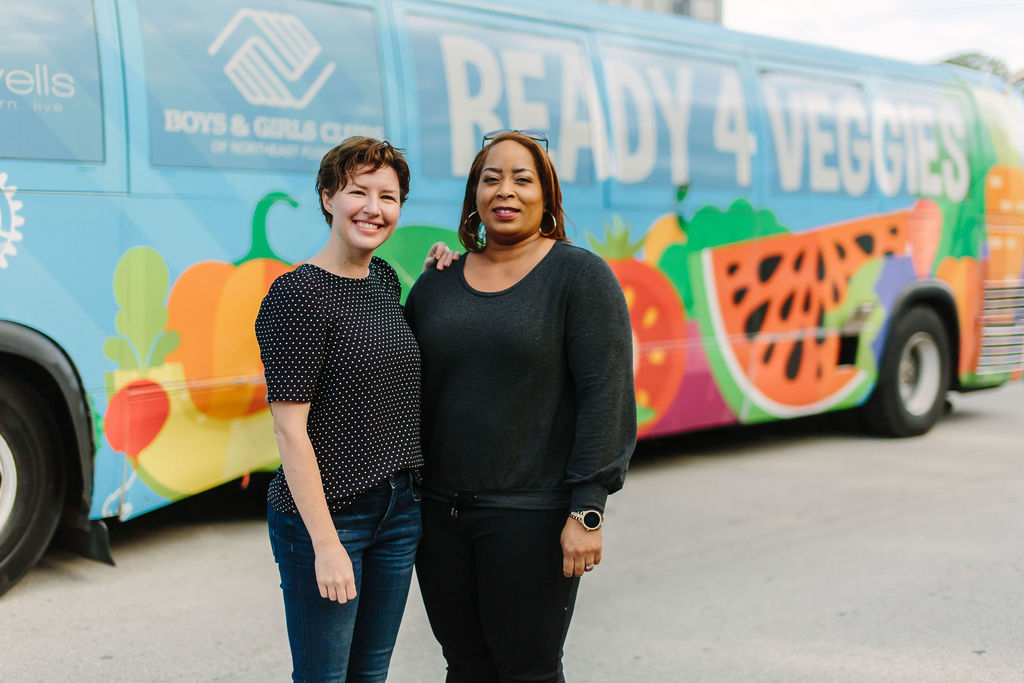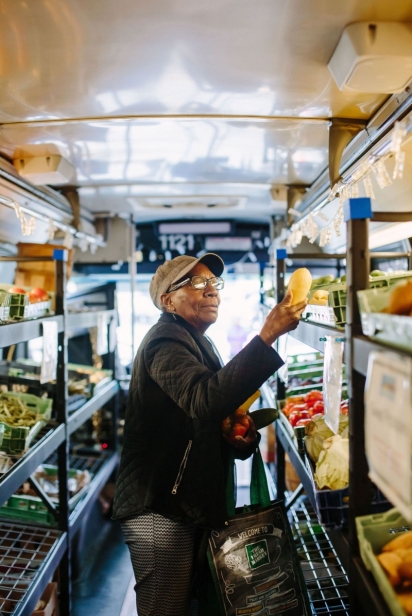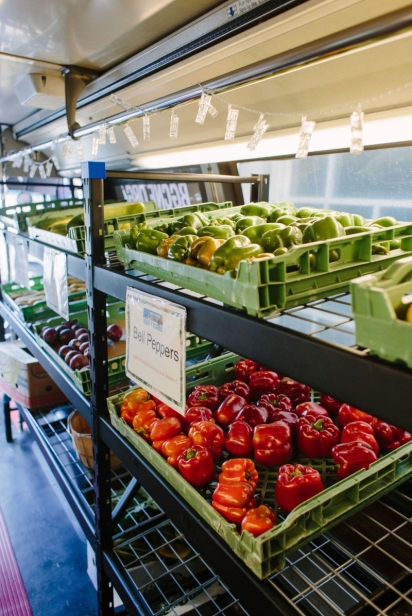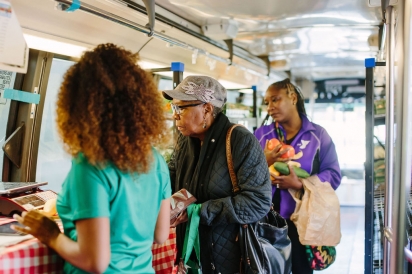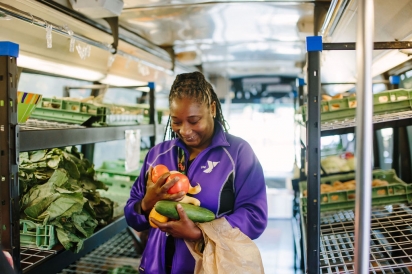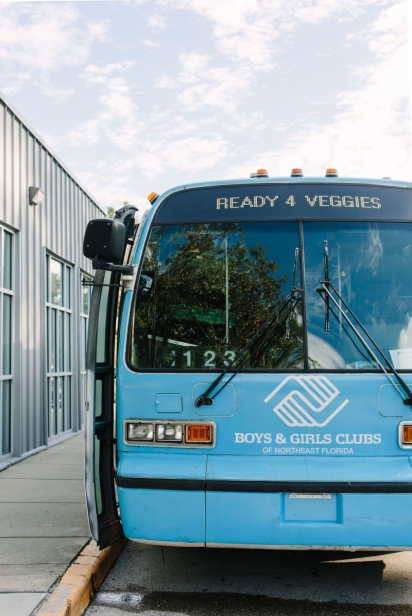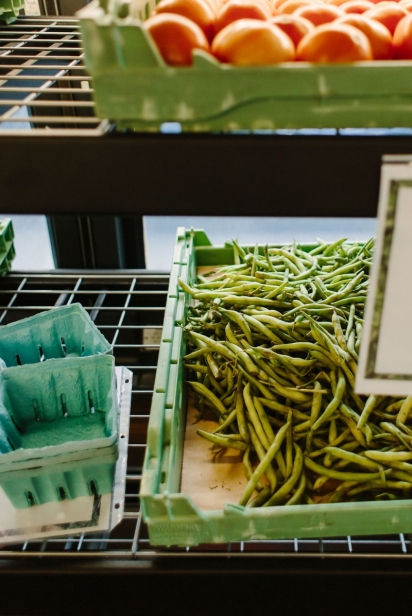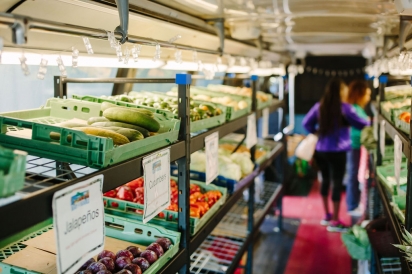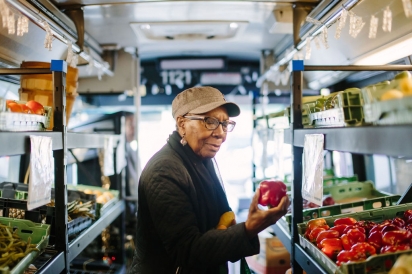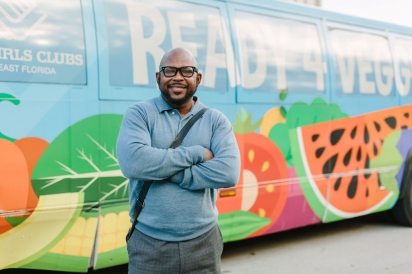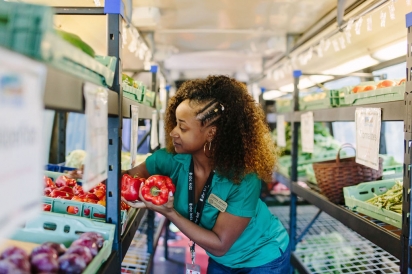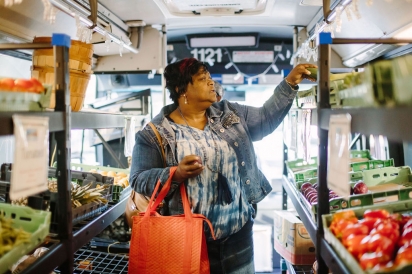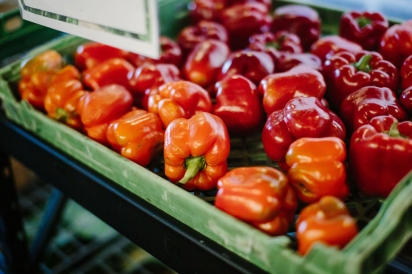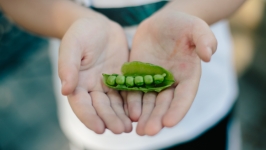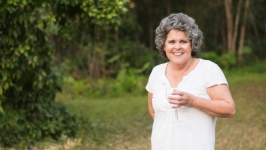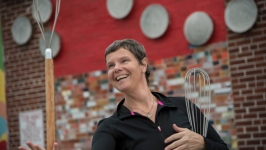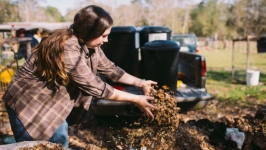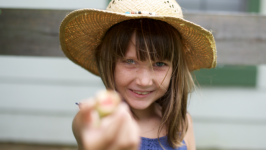Joining Forces Against Food Insecurity in Northeast Florida
Out of the back seat of her car, Alina Gonzalez pulls paper bags of ruby red hibiscus calyxes, curly kale and velvety green bunches of collards, all harvested within the last couple of hours, and hauls them into the Taylor Residences in Jacksonville’s San Jose neighborhood. Inside the senior living facility, the residents gather as Gonzalez hosts a demonstration on how to make simple, wholesome meals from her goods. At the end, everyone goes home with a bounty, and Gonzalez is off to make another fresh produce delivery.
For some of the elders, Gonzalez’s session is a chance to get quality produce now that their days of shopping on their own are limited. For others, it’s something new entirely. This is significant, as a lack of access to quality food can have huge consequences for the well-being of a community. As food insecurity increases, so do various ailments connected to diet such as diabetes, hypertension and high blood pressure. One of the most serious economic effects of food insecurity is the rise in additional health care costs due to an increase in chronic disease treatment, diabetes hospitalizations and hospital readmissions. Fortunately, regional advocates are pooling their resources to fight the challenges of food insecurity.
Gonzalez’s deliveries are part of a Senior CSA program at local senior living facilities by Urban Folk Farm, which she runs with her husband Simon Hoek Spaans on Jacksonville’s westside. “Right now I do three buildings, and every month it varies. Even if we are only grabbing ten people, let's say, that’s ten people we’re making healthier in that building in that month and what we've seen is that we have repeat customers.” Overall, the program reached 278 seniors during the 2018-2019 growing season, with plans underway to expand next year.
A CSA, or Community Supported Agriculture, is a system in which customers buy shares of a farm’s crop and then receive their portion throughout a season. The Senior CSA is part of Urban Folk Farm’s mission to bring quality food to those without consistent access to it. To that end the Senior CSA accepts SNAP, the modern incarnation of food stamps, and is part of Fresh Access Bucks, a program that doubles SNAP benefits to spend on Florida-grown fruits and vegetables. “Our farm is based on the premise that good food is a right for everybody,” said Gonzalez.
In 2019, Urban Folk Farm entered the Senior CSA program into the Statewide Food Insecurity Challenge hosted by Guidewell, the parent corporation of insurance giant Florida Blue. The challenge invited organizations from across Florida to pitch inventive ideas for addressing food insecurity; three finalists from each region received $2000 in seed funding and a chance to compete for the $20,000 statewide grand prize. The Senior CSA was one of the North Florida finalists along with two other Jacksonville entries. ‘Ohana No Ka Oi presented a concept to establish working farmland along the Emerald Trail, a chain of interconnected parks planned to circle Jacksonville’s urban core. In a bid that went on to win the grand prize, Foodery Farms pitched a plan to distribute fresh produce via a series of streetside vending machines available at all times throughout the year.
The Senior CSA is one of several new and established initiatives working to close the hunger gap on the First Coast. And as those involved in the programs have learned, the problem is so pervasive that addressing it requires collaboration with a wide array of stakeholders and resources.
According to Mike Neff, Chief Operating Officer and Chief Strategy Officer of the nonprofit Feeding Northeast Florida, food insecurity - the lack of access to sufficient quantities of nutritious, affordable food - is one of the most significant problems in the region. Nineteen percent of Duval County residents are food insecure, higher than the state and national averages.
Children and the elderly are the most at risk. According to Neff, in Duval County, 21.8 percent of kids and 25.4 percent of households with people over the age of 65 face food insecurity. “One in five of kids doesn’t know if, how or when they will next eat,” said Neff. “That means on any given day, 75,000 children don’t know if they’ll be eating a meal.” Seniors are a vulnerable group, as a majority of them qualify for only $16 SNAP benefits per month, which doesn’t come close to bridging the gap for those with little other income. Additionally, fully 46.2 percent of people of color and 60.5 percent of those without a college degree face food insecurity in Duval County. In total there are more than 200,000 food insecure individuals in Duval, and another 57,000 across Northeast Florida.
Food insecurity is a daunting problem, but Neff is optimistic that it can be reduced. “Fortunately, the solution to hunger is right in front of us,” he said. “There is plenty of food that is available; it just needs to be moved from where it is, to where it’s most needed.”
That’s where Feeding Northeast Florida comes in. The nonprofit works with local grocery stores, farms and other purveyors to save food that would be wasted and distribute it to those in need through their network of more than 160 community groups and pantries. This model reveals how integral collaboration is in tackling the food access gap. “Among the things we are most proud of is that every major retailer contributes to Feeding Northeast Florida.”
Helping to facilitate collaboration between organizations and businesses is the University of North Florida’s Center for Nutrition and Food Security (CNFS), established in 2017. According to CNFS director Dr. Lauri Wright, “what we’re trying to do is bring our students, faculty and community organizations together in a more coordinated way.”
One of the Center’s major initiatives is the Hunger Network, which helps connect organizations with the resources they need to help in the fight against hunger. They are currently in the process of creating an exhaustive list and map of organizations. “The Hunger Network is about gathering the resources and the data and getting collaborators together, and putting them all in a useful map,” said program director Meghan Niemczyk. Working through this network, the CNFS also oversees the Food Fighters and Meals on Wings, two student initiatives that repackage and distribute unused food from the dining facilities at UNF and partnering organizations.
Elsewhere in the city, groups are trying new and innovative ways to tackle hunger. Catherine Hart with the University of Florida Institute of Food and Agricultural Sciences (UF/IFAS) Family Nutrition Program founded the Farm to Community movement after meeting Gonzalez and Spaans of Urban Folk Farm at Riverside Arts Market. They quickly realized they could help each other reach the mutual goal of connecting fresh produce to those in need. “We realized that I had the resources for the people and [Spaans] and Alina had the produce,” said Hart. In 2018, they launched the Senior CSA program as the first Farm to Community pilot.
The Farm to Community project expanded in 2019 with the Boys and Girls Club of Northeast Florida’s Ready 4 Veggies Mobile Market. Funded by a USDA grant, the mobile market is a modified bus used to transport fruits and vegetables to areas that lack access to fresh produce. Program Director Taderra Rhymes hires students to help in the deliveries, and the bus visits Boys and Girls Club facilities and select partners in five low income areas. “It’s a win-win initiative, it helps educate the students in our clubs and it helps get the community to be healthier,” said Rhymes.
In addition to the Boys and Girls club locations, Ready 4 Veggies collaborates with Baptist Health’s Living Healthy Centers at two Northside YMCAs. The Healthy Living Centers provide services and educational programs for YMCA members and community residents that promote health and wellness. Carol Thomas, the Wellness Nurse at the Healthy Living Center inside the Johnson Family YMCA, sees it as a perfect collaboration. “The YMCA is the exercise portion of it, and the education that promotes health and wellness - that's the Baptist part of it,” she said.
Thomas was pleased to see the collaboration expand through the Ready 4 Veggies partnership. Thomas’ job involves screening patients’ health and helping them set goals to improve their diet and wellness. As such, she has found the ability to introduce patients to healthy foods through Ready 4 Veggies especially useful to her work: there’s no better teacher than direct experience. “We work with people here who had never had hummus, and now they buy it as a staple on their grocery list just because they were exposed to it,” she said.
This wellness aspect is a major part of the food security puzzle. “One thing we try to bring awareness to is the health inequities that exist for those who are food insecure,” said Lauri Wright of the Center for Nutrition and Food Security. Those facing food insecurity suffer negative consequences to their overall health. According CNFS research, a third of food insecure people in Northeast Florida suffer from diabetes and half have high blood pressure, diseases directly connected to diet. Simply feeding people is not enough. “We need to work on providing high quality, nutritious food to those in need so they can live as healthfully as possible. It’s not just being hungry, it’s also being healthy.”
Catherine Hart of Farm to Community echoed that sentiment. Urban Folk Farm’s Senior CSA is as much about quality as quantity. “It's not just that we’re providing fresh local produce at places where people live, it's also that it's the highest quality produce that you can get,” she said. “Just because you are on a budget or eligible for SNAP benefits doesn't mean that you don't deserve the same quality as everyone else.”


